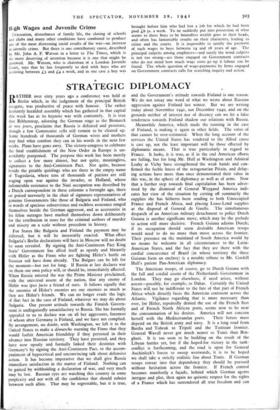High Wages and Juvenile Crime Evacuation, disturbance of family life,
the closing of schools and clubs and many other conditions have combined to produce we of the most distressing social results of the war—an increase in juvenile crime. But there is one contributory cause, described by Mr. John A. F. Watson in a letter to The Times, which is the more deserving of attention because it is one that might be removed. Mr. Watson, who is chairman of a London Juvenile Court, says that he has frequently to deal with boys who are receiving between £3 and £4 a week, and in one case a boy was
brought before him who had lost a job for which he had been paid £6 5s. a week. To be suddenly put into possession of what seems to these boys to be boundless wealth goes to their heads, and often has lamentable results on their characters, leading to crime and the courts. It is impossible to justify the payment of such wages to boys between 14 and 18 years of age. The principal culprits among employers—and surely the word culprits is not too strong—are those engaged on Government contracts who do not mind how much wage costs go up if labour can be found. The whole question of wage-payments by firms engaged on Government contracts calls for searching inquiry and action.


























 Previous page
Previous page